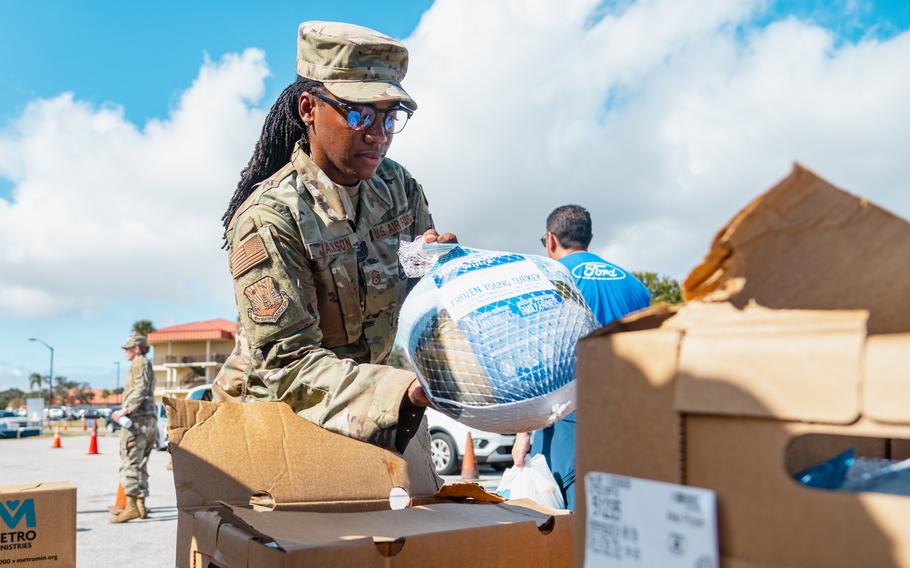
U.S. Air Force Master Sgt. Sarabrian Jackson, 6th Maintenance Group quality assurance chief inspector, unloads turkeys during a Nourish the Service event at MacDill Air Force Base, Fla., Nov. 17, 2023. The event provided food for service members and their families. The Pentagon in its fiscal 2025 budget request is asking Congress to expand the pool of troops that qualify for a monthly basic needs allowance by raising the household income cutoff from 150% of federal poverty guidelines to 200%. (Zachary Foster/U.S. Air Force)
WASHINGTON — Senior enlisted leaders threw their support behind a proposal to widen military family eligibility for a basic needs allowance on Wednesday, urging lawmakers to approve the measure to help lessen food insecurity.
The Defense Department in its fiscal 2025 budget request is asking Congress to expand the pool of troops that qualify for the monthly allowance by raising the household income cutoff from 150% of federal poverty guidelines to 200%.
Few service members and mostly only those with large families are taking advantage of the stipend in its present form, which became law in 2021, senior leaders told members of the House Appropriations Committee on Wednesday. Troops must have at least one dependent to be eligible.
In the Army, only 16 people are receiving the allowance, according to Sgt. Maj. Michael Weimer. One of them, an E-4 rank that lives at Washington’s Joint Base Lewis-McChord, had to have nine dependents to qualify for the supplemental.
“I had to have my team do the calculation on the whiteboard for me to truly understand between federal poverty guidelines and gross household income, and I felt like I needed an accounting degree to truly understand how to get soldiers to take advantage,” Weimer said.
Raising the income ceiling would mean that a family of eight would need to make under about $105,000 to qualify for the stipend instead of the current threshold of about $80,000. An average allowance today is more than $1,000 per month.
Pentagon officials said the eligibility expansion would cost $245 million and help decrease service member reliance on the Supplemental Nutrition Assistance Program, formerly known as the food stamp program.
Nearly 26% of active-duty troops are considered to be food insecure, meaning they skip or cut meals or go hungry instead of eating, according to a 2023 study by the Rand Corp. think tank that examined 2018 data.
It is unclear if a larger group of candidates for the basic needs allowance will have the impact the Pentagon intends. A recent survey by the nonprofit organization Blue Star Families found that the allowance is having a limited effect so far on alleviating hunger.
“Our limited, but novel, data shows that this new policy may not yet efficiently target food insecure military families, though this may change as more families become aware of the program,” the survey states. “Many families who could benefit are unaware of the program.”
Chief Master Sgt. John Bentivegna of the Space Force said it was “unacceptable” for a military family to not have enough food on the table. But he said educating families, specifically young enlisted members, about budgeting and healthy eating was also an important part of addressing food insecurity.
“From a financial perspective, we have to make sure service members have at least enough money in the bank account so they can budget appropriately to make sure that they are buying the right foods and having the right access to the foods,” Bentivegna said.
The basic needs allowance is a helpful tool, he said, though it needs to be coupled with a broader effort to boost overall compensation and pay for troops who are stretched thin financially.
Master Chief Petty Officer James Honea of the Navy also advocated for that approach and said sailors and other service members need to be paid salaries that are reflective of their unique roles and responsibilities.
“That young 19-year-old that’s working at the Starbucks is not the same thing that we’re asking of our 19-year-olds who are serving in harm’s way,” he said.
The Defense Department is proposing a 4.5% pay raise for troops next year but lawmakers have made clear that they also want to see targeted pay hikes that specifically focus on junior enlisted service members.
The White House has resisted proposals to make dramatic pay changes until the Defense Department completes its quadrennial review of military compensation.
Honea said on Wednesday that the review should result in pay models that account for the difficult work performed by troops and perhaps align with compensation models for first responders, who often receive hazard pay for dangerous work.
“If we look after the well-being [of troops], and we pay our people appropriately, then we won’t have to worry about the basic needs allowance or be overly concerned about food insecurity,” he said. “If we pay them appropriately, they’ll figure out how to feed themselves.”